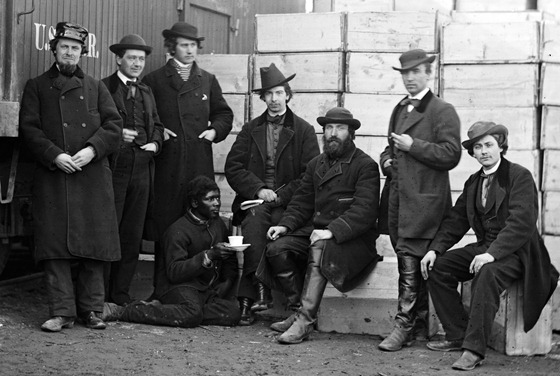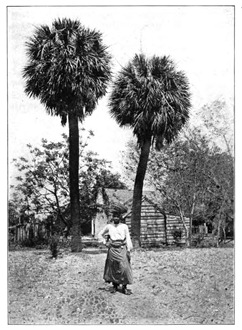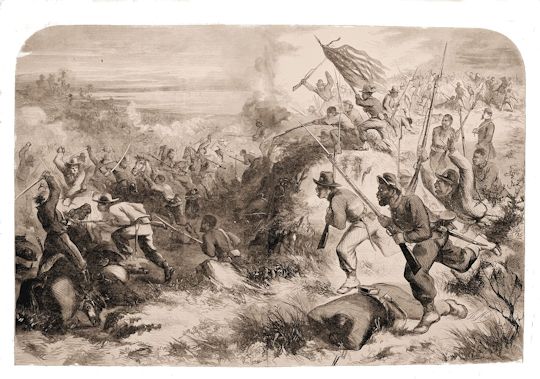Sunday, 1st February—Rained all day, came within four miles of Charlotte. A very poor country. I and Reuben Slaughter went out and staid all night with Mrs. Hood. Her husband had been conscripted. She boiled a ham, baked some pies, filled our haversacks and started us on our way rejoicing. Came down to Mr. Ventress.
Friday, February 1, 2013

“I tell you, between ourselves, that of the 30 line officers there are not more than six that are worth their salt.”–Army Life of an Illinois Soldier, Charles Wright Wills.
Camp 103d Illinois Infantry, Jackson, Tenn.,
February 1, 1863.
I’m on duty as “field officer of the day,” and have been temping around in the mud looking to policing, guards, etc., and just now a detail has come for me to go on picket to-morrow. I was only relieved from picket yesterday morning. We are very short of officers, having only 11 for duty in the regiment. All sick. D—n ’em, they ought to resign and let men draw the pay who do the work. I have seven men in the hospital now, one of whom is going to die. Poor fellow, how I do pity him. I never thought as much, even of my sick comrades in the 8th, as I do of my men when they get sick. James Colton is the one’s name who is the sickest. He is a real good young man and has a wife. Lives in the west part of the country. Mine is the only company that has no deserters yet, and I don’t believe I will have any. Half of these desertions are the fault of officers. I have been out this evening calling on a family named Stephens, living near our camp. They are strongly secesh, but very fine people. No girls in the family but a splendid looking young wife. I guess that we are cut out of that Vicksburg fight, though if this place is evacuated, there is a chance yet. That is the only one though, for all the troops except our brigade have left here. Some to Memphis, and I suppose, below. It makes our duty pretty heavy. Picket every third day, besides police, foraging, and fatigue and camp guard. But I always enjoy duty better than quiet camp life. I’m afraid this agitation North is going to play the d—l with the army. The great body is loyal enough but can’t help being discouraged and, in a degree, disappointed when treason is preached openly in the North and unrebuked. Confining a lot of those traitors would have an excellent effect on the soldiers; but I believe that Lincoln is almost afraid to try that again. If this regiment is paid off before there is the change in officers there should be, I’m afraid desertions will be very numerous. I begin to feel some of the old soldier’s prejudice against the “forty-dollar man,” but I do believe we can, if properly officered, make a crack regiment. I tell you, between ourselves, that of the 30 line officers there are not more than six that are worth their salt. The others do 100 times more harm than good to the service. I modestly count myself one of the six, so that you can judge better what I think they are. I read Dick Oglesby’s speech to-day. The sentiment is all right, but he can talk much better than that. Suppose he is out of practice. We are a little afraid of the result of the Vicksburg fight. If we get whipped I’d like to die there, for I believe if that army is whipped it will be annihilated; and the cause about lost, which little event I don’t care to live to hear. You can’t imagine bow careful the commanders are here of secesh property. Well, if ’tis through the right motive, I say all right, and I guess it is, but it hurts me anyway. I can’t help hoping that this town will be burned when evacuated, for it is the most intensely secession place of all. It first unfurled the Rebel flag in this State, and sticks to its colors nobly. It is rumored that Van Dorn is coming in this direction again. I do hope he will come here, for if we can drive him off, it would hurt the natives so much to see him whipped.
Aquia Creek Landing, Va. Clerks of the Commissary Depot by railroad car and packing cases, photographed by Alexander Gardner in February 1863, exact date not provided.
Library of Congress image.
General Saxton and Captain Hooper were over to church and to the Oaks to dine. General Saxton takes a gloomy view of our holding these islands. General Seymour says they must be held. General Saxton is much opposed to the sale of the land to speculators. He thinks they ought to be preempted by the people, or else so divided and sold that the people can buy, and not be left a prey to greedy speculators and large landholders. He thinks matters are being, injuriously to the people’s interests, hurried forward in favor of purchasers. He is much troubled and grieved about it. I suggested that Hunter should stop the sale. General Saxton caught at the idea. He went to Hilton Head yesterday and the sales are stopped as a military necessity. General Hunter wants to know first where he shall put refugees who come every day, and where he shall get timber for Government uses after the lands are sold; whence, too, will come supplies for his army.
Columbus, Ohio
1st. Went up to Melissa’s after breakfast in the rain. N. there. Stayed to dinner. About 2 started out with N. in a drizzle for Camp Chase. Rather tires me walking. Enjoyed rehearsing my good visit home with Ma, F. and other friends.
Sunday, 1st—We had an all day rain and the river is rising; the bottom land on the east side of the river is already under water. It came my turn to go on fatigue today. A detail of four hundred men was again sent down to work on the break in the levee. Our chaplain preached to the regiment this afternoon.
Md. Heights, Jan. 25, 1863.
Dear Family:
Have written a note to Lizzie [his sister]. She says her school is “behaving in behavior.” We stop in No. 9 tent; it is stockaded and in rear of barracks; the women have our shanty.
Feb. 1.
We were all paid up Thursday for four months. I shall send the money by Adams express. I have collected all in the Co. but P. and G――n’s. I think I can get G―n’s before I send money; P’s is doubtful. Shall send Geo. Bricket’s with mine. We had a terrible storm; here on the Mountain the snow is two feet deep and it blows. M. was promoted to Corpl. yesterday. S. was broke. The boys are very indignant about it; you know he did not come out until last Sept. We have got so we have a row every day. Capt. has some one to the wheel every night; he has got the rough ones down on him. Co. sent home $1709 yesterday and paid debts for 6 months. I went down to the Naval battery and collected two bills there. There is a report that we are to move. Shall send our money on Tuesday, so look out for it. If we happen to move shall wait. Much love to all from
Lev., Jr.
Washington. Feb’y 1st 1863. Sunday.
Went to the Capitol today and heard the Chaplin Dr Stockton. He is rather dry and tedious, his sermons this winter have been more of a doctrinal, than a practical character. I believe in practical Christianity and practical preaching. I dont suppose that I am very orthodox, for it does not matter much to me whether a man believes this or that particular dogma, or belongs to this or that denomination. If he acts like a christian from day to day. If he is always ready to do as he would be done by. To forgive as he would wish to be forgiven, I am bound to believe that he has the spirit of Christs teachings in him and is a christian. After all my experience in the world I am much given to judging the tree by its fruit, professions of faith and all the “thirty nine Articles” to the contrary notwithstanding. After dinner I walked up to the “Stone Hospital,” got very muddy. Staid there a couple of hours and walked back in a drizzling rain. Not many NY Soldiers there. One, Robert White, must have his foot taken off. He is a brave boy, not over eighteen, says he wants it done soon, as he can then go home after a little while, poor lad, he has much to suffer yet. He is from Westchester Co. of the 9th NY Militia. I have not been out since I returned. Got two good letters from home this morning, one from Wife, and one from Julia. They seem much elated because I spoke in my last of going home in a month or so. I will go if I can consistantly with my duties in the office.
Buntyn Station, Sunday, Feb. 1. It is Sunday, but hard to realize it. The same routine is gone through as upon the other days, the cards shuffled with equal liveliness, the game of ball with the same noise. And I lay in my tent never realizing that this is the Sunday that I used to spend at home with such stillness, when the horses stayed in the stable unhitched, all work laid aside. Ah, well I remember the first Sunday spent in the army, how I used to recoil as I heard the boisterous oaths and reckless sport of the soldiers as they were returning to their comrades on that clear Sunday morning from Columbus to Corinth. It was just five months ago to-day, and am I really so much changed? Can it be that I am so much more vicious and wicked than then, that I heed not the Sabbath? God forbid. But what does company have to do? Almost everything. I flatter myself that it is not so very wicked. It cannot be.
In the evening I went to Griffith’s “shebang” and listened to sacred music. It sounded as of old. “I’m a Pilgrim”, “There is a Happy Land” etc. But a soldier is a soldier, and the “Dixie” and “Gay and Happy” were promiscuously mixed. Weather warm and sunny. Heard that the 2nd Wisconsin Cavalry were at Memphis.
NEGROES AS SOLDIERS.
WE devote pages 161, 168, and 169 to illustrations of the negroes as soldiers. So much ignorant prejudice is still entertained in many parts of the North to the employment of colored troops that it is due to the country that the capacity of the negro to drill and fight can not be too strongly insisted upon.
The picture on page 161 represents the negro learning the use of the Minie rifle. The drill masters in the Department of the South report that the negroes in the South Carolina regiments evince great aptitude at learning the manual of arms. They are more docile than white recruits, and when once they have mastered a movement they retain the knowledge perfectly. Similar testimony is borne by officers in the West. One of them predicts that with proper drill and training the negroes will be the steadiest rank and file in the world.
With regard to their fighting qualities we can not do better than reproduce the following extracts. The first is from a letter to the New York Times, describing the battle, or rather the skirmish of Island Mounds, where a detachment of the First Kansas Colored Volunteers attacked and routed a band of rebels. He says:
The detachment under Gardner was attacked by the foe, who swept down like a whirlwind upon it. One volley was fired in concert, which emptied several saddles, and then this devoted body was separated by the force of that sweeping charge. The fight thus became a hand to hand encounter of one man to six. The rebels were mostly armed with shot-guns, revolvers, and sabres, our men with the Austrian rifle and sabre-bayonet. The latter is a fearful weapon, and did terrible execution in the hands of the muscular blacks. Six-Killer, the leader of the Cherokee negroes, fell with six wounds after shooting two men, bayoneting a third, and laying a fourth hors du combat with the butt of his gun. Another one, badly wounded, Sergeant Ed. Lowrey, was attacked by three men; he had discharged his rifle, and had no time to load again, when they fell upon him with revolver and sabre. He was then badly hurt with a shot-gun wound. One man demanded his surrender, to which the reply was a stunning blow from the butt of the rifle, knocking him off his horse. The negro, when approached, had his sabre-bayonet in hand, about to fix it on his gun. The prostrate man got a crashing blow from it on the skull as he fell, and then, as the other charged, the bayonet was used with effect on the nearest horse, and the butt of the gun on the next man.
Captain Crew, retaining his position at the head of the few men who keep together, retreated with his face to the enemy, firing his revolver as he did so. He fell with a terrible wound in the groin, but again rose and retreated. Surrounded by half a dozen of the foe, he was ordered to surrender. “Never!” he shouted, at the same time calling to the half dozen negroes around him to die rather than give up. He then fell dead with a bullet in his heart. His body was instantly rifled of revolver and watch, though his purse was not found. Five minutes afterward the rebel who took the watch was killed by one of the negroes, who again took the watch from him and brought it into camp.
So ended the battle of Island Mounds, which, though commenced through the rash and impetuous daring of the officers, yet, under most unfavorable circumstances, resulted in a complete victory to the negro regiment.
What I narrate I saw myself, and having witnessed several engagements since this rebellion commenced, I know what fighting amounts to. H.
__________
The other extract is from the official report of Colonel Higginson of the First South Carolina Volunteers (colored), describing an expedition into the interior undertaken by him:
ON BOARD STEAMER “BEN DEFORD,” Sunday, Feb. 1, 1863. Brigadier-General Saxton, Military Governor, etc.:
GENERAL,—I have the honor to report the safe return of the expedition under my command, consisting of 462 officers and men of the First Regiment of South Carolina Volunteers, who left Beaufort on January 23, on board the steamers John Adams, Planter, and Ben Deford. The expedition has carried the regimental flag and the President’s Proclamation far into the interior of Georgia and Florida. The men have been repeatedly under fire; have had infantry, cavalry, and even artillery arranged against them, and have, in every instance, come off not only with unblemished honor, but with undisputed triumph. At Township, Florida, a detachment of the expedition fought a cavalry company which met us unexpectedly on a midnight march through pine woods, and which completely surrounded us. They were beaten off with a loss on our part of one man killed and seven wounded, while the opposing party admits twelve men killed (including Lieutenant Jones, in command of the company), besides many wounded. So complete was our victory that the enemy scattered, hid in the woods all night, not returning to his camp, which was five miles distant, until noon next day—a fact which was unfortunately unknown until too late to follow up our advantage. Had I listened to the urgent appeals of my men, and pressed the flying enemy, we could have destroyed his camp; but in view of the darkness, his uncertain numbers, and swifter motions, with your injunctions of caution, I judged it better to rest satisfied with the victory already gained.
Nobody knows any thing about these men who has not seen them in battle. I find that I myself knew nothing. There is a fiery energy about them beyond any thing of which I have ever read, unless it be the French Zouaves. It requires the strictest discipline to hold them in hand. During our first attack on the river, before I got them all penned below, they crowded at the open ends of the steamer, loading and firing with inconceivable rapidity, and shouting to each other, “Never give it up!”
__________
Published in March 14, 1863 issue of Harper’s Weekly.










